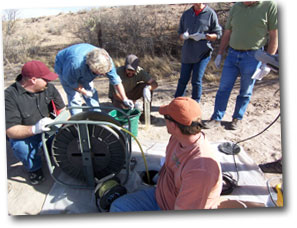
Las Cruces, NM 88011
Phone: 575-532-5535
info@envirofieldschool.com

"Learn Practical Field Methods from the Field Training Experts."
This intensive four-day course features classroom instruction on sampling
 |
| Students learn how to analyze soil samples for metals in the field using an XRF analyzer. To make things more interesting, everyone brought samples with them to the class to analyze, which made for some interesting discussions in the field. |
 |
| Students learn correct ground-water sampling techniques as they operate a gear-drive pump in one of the Field School's training wells. Students learn why it is so important to implement good QA/QC during all aspects of well purging and sampling to ensure that the most representative sample possible is ultimately submitted to a laboratory for analysis. |
strategies, methods and equipment used for sampling soil, ground water, surface water, sediment and waste.
The first day of the class sets the stage for the next three days by covering preparation of effective multi-media sampling and analysis plans; strategies for sampling environmental media; field QA/QC; field equipment decontamination; sample handling and shipment; and documentation of environmental sampling events.
The science behind soil sampling, soil sampling methods and equipment, US EPA Method 5035, and field sample analytical methods (including use of XRF, field-portable gas chromatographs, analyte-specific field kits and immunoassay) are covered in detail on day two.
The science behind ground-water sampling, purging and sampling methodologies, field water-quality indicator parameter analysis, sampling equipment and operational techniques, sample collection and pretreatment (filtration and preservation) traditional, low-flow purging and sampling methods and no-purge sampling techniques, are all covered in detail on day three.
On the fourth day of the course, surface water, sediment and waste sampling strategies, methods and equipment are covered in detail.
Testimonials about this Course
Looking to Earn Continuing Education Credits For this Course From a State Agency Program?
The Nielsen Environmental Field School is an Internationally recognized provider of quality environmental training courses. As a result, our courses are widely accepted by both regulatory and non-regulatory state agencies that require environmental professionals to obtain training to maintain professional licenses or accreditations. A summary of some of the agencies that have included this course in their list of approved courses is provided below. If you don't see a particular program listed, give us a call.
There are as many different ways to calculate "Continuing Education Units" (CEUs) as there are programs that accept our courses for earning continuing education credit. Contact the program you are working with to determine exactly how it calculates CEUs.